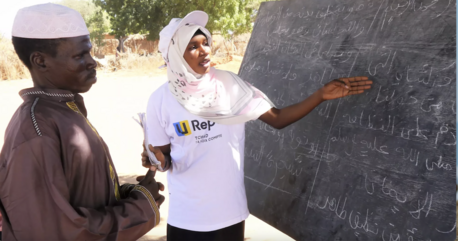
A Young Sudanese Refugee Gives Back to Her Host Community in Chad
Forced out of her home and university by the ongoing war in Sudan, 23-year-old Mouwahib Mahamat Adam is teaching literacy skills to children and young people in southeastern Chad. "They share their lands with us, I share my knowledge with them. I will always remember my time in Chad, and the Chadians will also remember me," she says.
Under the big tree in Guindo village in southeastern Chad, around 30 miles from the Sudanese border, a group of young people between the ages of 14 and 22 are gathered, sitting on a spread-out tarp on the ground. They are listening intently to 23-year-old Mouwahib Mahamat Adam, who is giving them a reading and writing lesson.
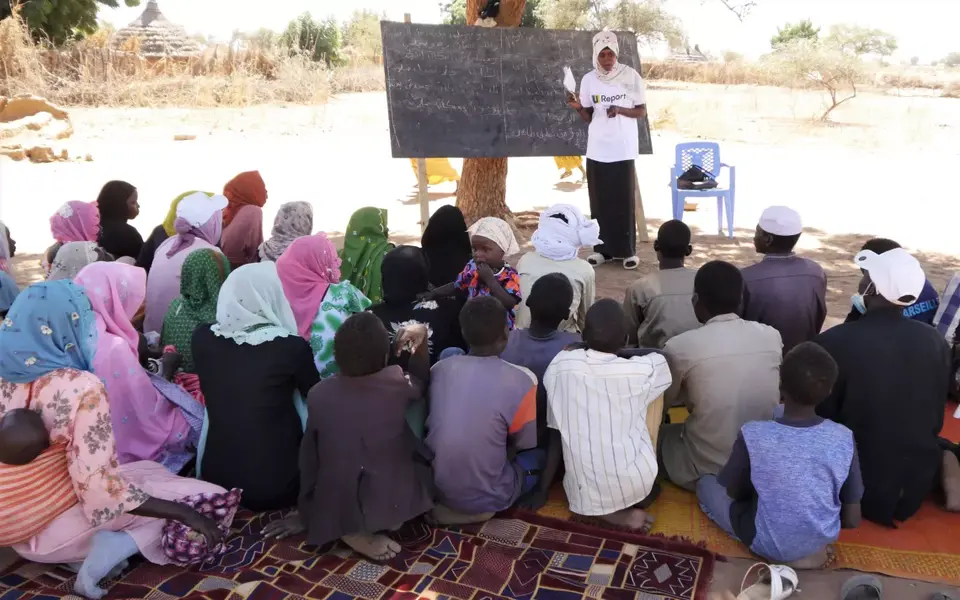
No country has taken in more Sudanese refugees than Chad
Since the start of Sudan's civil war in April 2023, over 7.6 million people — over half of them children — have been forced to flee widespread violence. More than 542,000 registered Sudanese refugees have taken refuge in Chad.
As she was about to finish her biology degree at Al-Genaïna University in Sudan, Mouwahib and her family fled to safety in Adré, in the Oudaiï region of Chad, and eventually settled in the Ourang refugee camp near the village of Guindo. At the camp, the basics are provided — shelter, food and water — but for Mouwahib, transitioning from city life to a small village came as a shock.
Before the crisis, Guindo was home to about 2,000 inhabitants, most of whom were farmers and herders, who had never been to school and did not speak any of Chad's official languages. In both the village and the refugee camp, young people are worried because they feel their concerns are not being addressed, and with this new situation, they are exposed daily to the risks of intercommunal violence. Young girls are also concerned about the risks of gender-based violence, especially sexual violence.
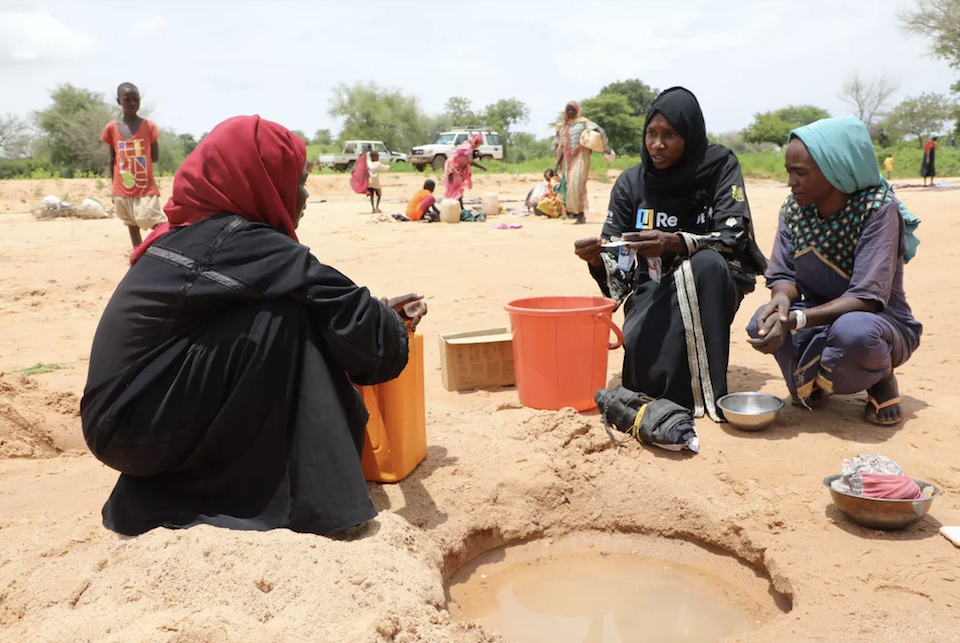
Chadian and refugee youth find common ground in a UNICEF-supported community engagement program
UNICEF helped the youth delegation of Ouaddaï gather Chadian and refugee youth in a community engagement program. Participants are invited to reflect on the common challenges they face due to this new situation, including cohabitation problems, and to find solutions to improve life around them.
During a water treatment awareness demonstration organized by the Ouaddai youth delegation and UNICEF, the facilitators realized they were having difficulty being understood — most learners, especially the indigenous ones, had not mastered Arabic. Mouwahib proposed to help by translating the demonstration into Massalit, the local language also spoken in Darfur, the Sudanese region on the other side of the border.
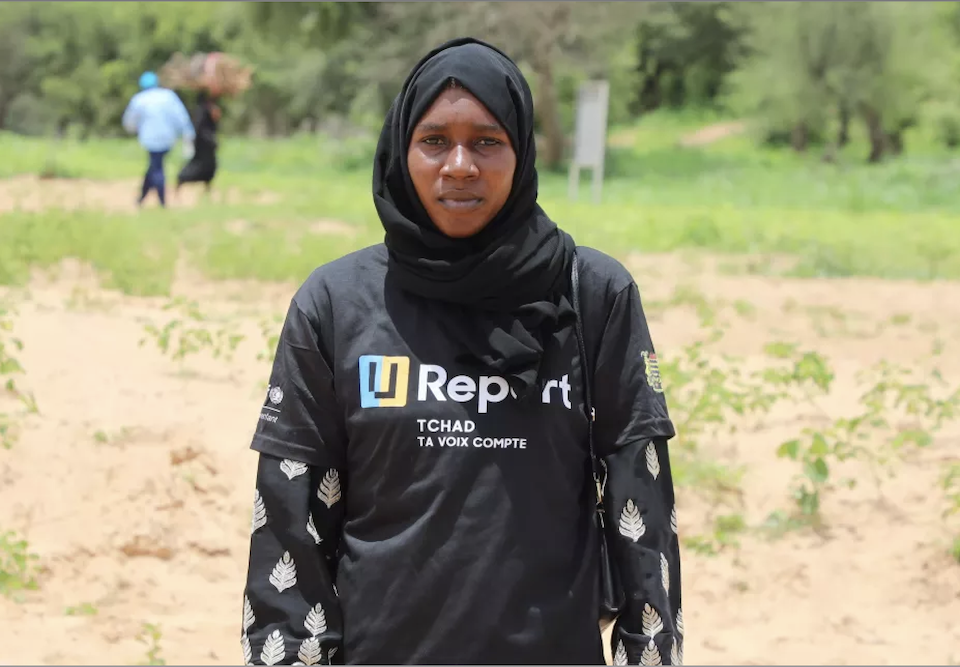
Eager young students built a blackboard and pooled their money to buy chalk for their lessons
From there, Mouwahib decided to organize literacy lessons for indigenous youth. Enthusiastic about the idea, the village youth built a blackboard and pooled money to buy chalk. Guindo’s village chief himself granted a dedicated space for learning.
Three times a week, Mouwahib slings over her shoulder the small bag that a humanitarian worker gave her as a thank you for translating in the camp. Inside the bag is a notebook in which she has prepared the lesson of the day. Mouwahib crosses the camp and walks to the village. As she approaches the village, children run to meet her. Some take her bag, others hold her hand and lead her under the tree where about 20 young people are waiting. Each lesson lasts two hours, and Mouwahib ensures that all students participate, eager to learn.
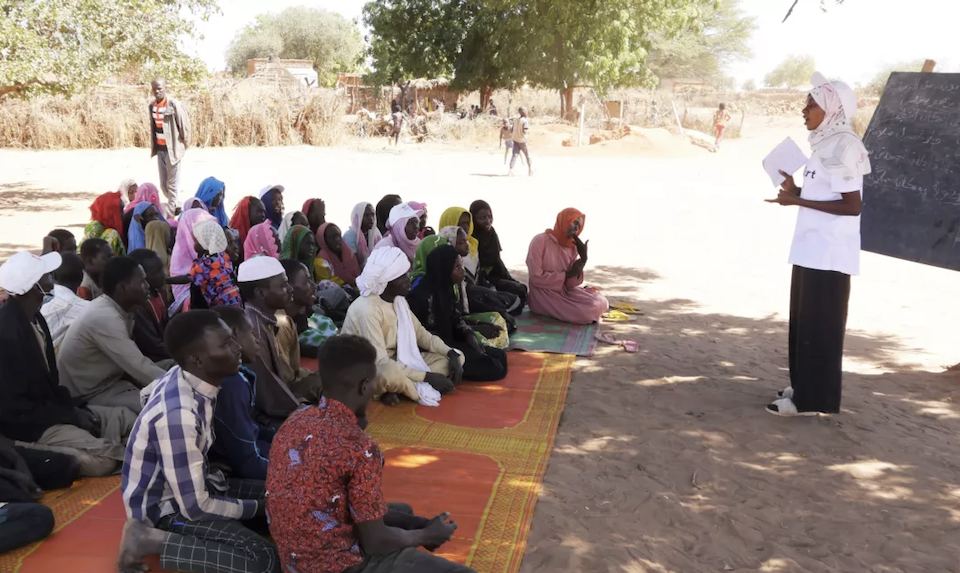
The literacy classes help strengthen ties between refugees and the host community
"I thought it was impossible for a person of my age to learn to read and write," says 20-year-old Youssouf Ahmat Abakar, one of Mouwahib's students. "We were isolated because we don't know any national language to communicate with other Chadians or foreigners. Since I started the lessons, I don't want to miss any; I plan to continue learning, and then I would like to find an opportunity to enroll in a literacy program."
Youssouf, who initially hesitated to have a girl teach him, has become one of the most committed young people advocating for girls' education. "Mouwahib has become our sister, and thanks to her, we have increasingly fraternal relations with the refugees. Her commitment has also made us understand that an educated woman can better serve others," he says.
Mouwahib has become our sister, and thanks to her, we have increasingly fraternal relations with the refugees. Her commitment has also made us understand that an educated woman can better serve others. — Youssouf Ahmat Abakar, 23
Mouwahib's commitment has lead the village to open its doors even more to refugees, who can come to find shade during the day under the big trees and chat with others. Abdoulaye Abakar, Guindo’s village chief, decided to allocate Mouwahib a piece of cultivable land in recognition of her efforts to teach others to read.
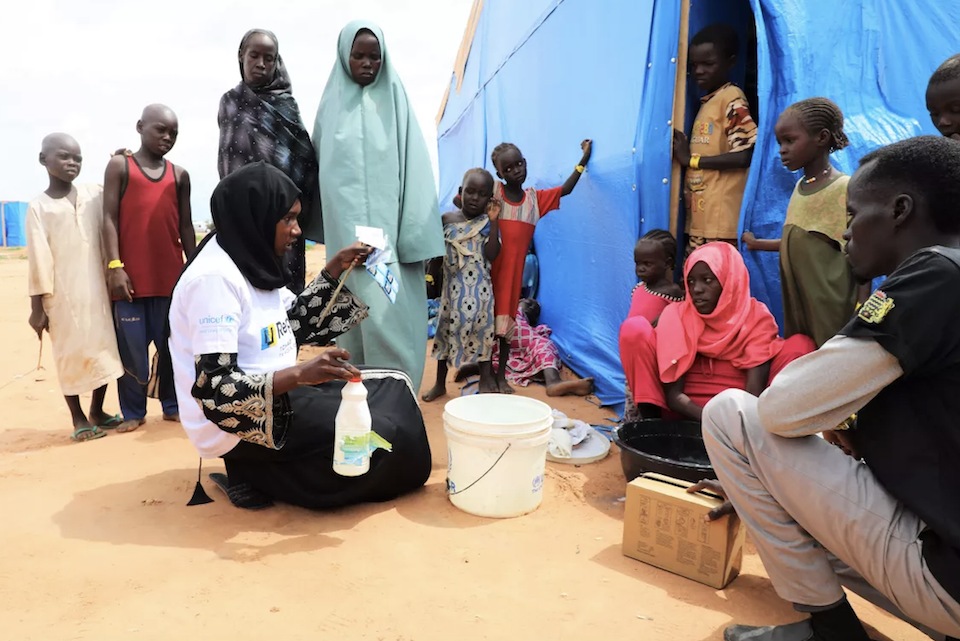
UNICEF and partners train young people as community mobilizers, sharing health and hygiene information
Back at the refugee camp, Mouwahib cooks for her mother and sisters, then walks to the youth space after her nap. In this space, set up by UNICEF and the Chadian government, Mouwahib joins other young people in the group to plan water, sanitation and hygiene (WASH) awareness activities.
Armed with supplies and training from UNICEF and non-governmental organizations, they go door-to-door in the community, teaching families how to keep their children healthy and prevent the spread of disease, strengthening the resilience of both Chadians and their Sudanese neighbors.
Learn more about how UNICEF is working to aid children affected by the war in Sudan.
This story was originally published on UNICEF.org
HOW TO HELP
There are many ways to make a difference
War, famine, poverty, natural disasters — threats to the world's children keep coming. But UNICEF won't stop working to keep children healthy and safe.
UNICEF works in over 190 countries and territories — more places than any other children's organization. UNICEF has the world's largest humanitarian warehouse and, when disaster strikes, can get supplies almost anywhere within 72 hours. Constantly innovating, always advocating for a better world for children, UNICEF works to ensure that every child can grow up healthy, educated, protected and respected.
Would you like to help give all children the opportunity to reach their full potential? There are many ways to get involved.





